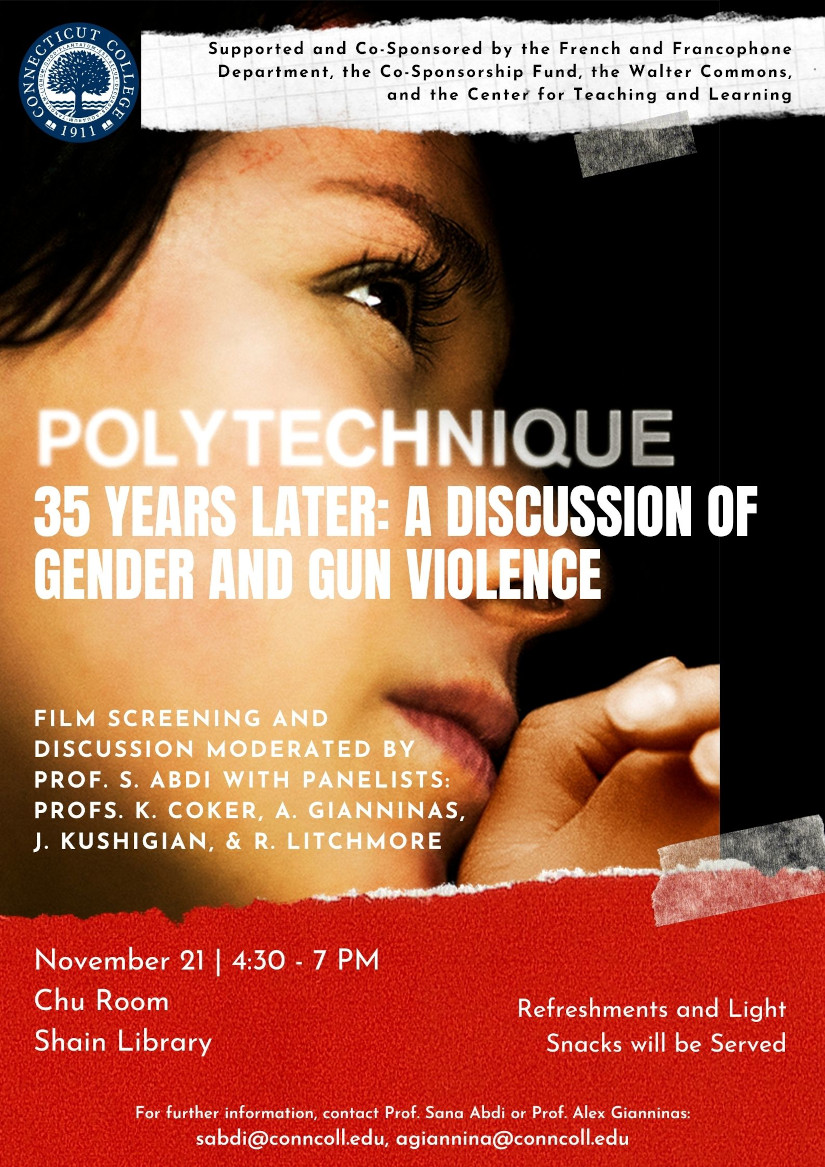
Faculty panel discusses gender-based violence in reaction to 2009 film ‘Polytechnique’
Four professors across different departments hosted a screening of the movie “Polytechnique” Nov. 21 in the Chu Room at Shain Library, followed by a panel discussion that touched on gun control, gender violence and mental health. The 2009 film written and directed by Denis Villeneuve depicts a mass shooting in Canada 35 years ago today, on Dec. 6, 1989, that targeted female college engineering students at the École Polytechnique in Montréal. The shooter killed 14 women and wounded 10 women and four men.
Assistant Professor of French and Francophone Studies Sana Abdi, who moderated the panel discussion after the film, said, “While the film captures the events with haunting clarity, it also raises broader questions about the global issue of mass shootings, the depiction of violence in cinema, and the cultural and political ramifications of gender-based violence. At its core, ‘Polytechnique’ examines how acts of misogyny are embedded within larger societal structures, offering both a deeply personal and a culturally resonant narrative.”
The three panel members were Montréal native and Assistant Teaching Professor of Astronomy Alex Gianninas, who provided insights into the cultural and political context of Quebecois society and its intersections with feminism and nationalism; Assistant Professor of Psychology Kendell Coker, who is a clinical psychologist and an attorney specializing in mental health law and gun violence prevention who has expertise in trauma, violence and systemic disparities within the criminal justice system; and Professor and Chair of Hispanic Studies and former Social Justice and Sustainability Pathway coordinator Julia Kushigian, who completed a Fulbright project in Ecuador in 2023 titled “The Eradication of Gender-based Violence.”
Abdi began the post-film discussion by asking the only Montréal native in the room for his point of view. “This was 10 years before Columbine,” Gianninas said. “I was eight years old, and the shooting happened around 5 p.m., so this was the evening news for us. And we just couldn't understand someone walking into a school and shooting it up.”
The astronomy professor said the women in STEM movement had already taken hold in Canada by 1989, and when he was pursuing his master’s and Ph.D. more than a decade later at the Université de Montréal, which the École Polytechnique is affiliated with, half of his classmates were women. “The film shows us not just that the women were there, but that the main character was top of her class—the women deserved to be there.”
Gianninas said the massacre ignited a discussion about gun laws and rights in Canada, and legislation was soon passed tightening gun control and establishing a registry. “The sad part is that many of those laws have since been repealed, so a step forward was taken, but unfortunately, there was a step back too.”
Coker has treated both victims and perpetrators of violence, and he works with state officials, nonprofit organizations and local stakeholders to mitigate the harms of gun violence and fight for common sense gun legislation. He shared some challenges with extreme risk protective orders called red flag laws, in which a friend, family member, partner or mental health professional can petition the court and law enforcement to confiscate someone’s guns if they believe the person to be dangerous. “But then you still have to prove that they're not OK and they shouldn't have their guns, and if you can’t do that, they can get their guns back,” he said.
Coker added that one in three women worldwide is a victim of either sexual or physical violence. For gun violence specifically in the United States in 2020, three to four out of every 100,000 white women and 11 to 12 per 100,000 Black women were victims.
Kushigian, who joined the Conn faculty in 1985, said she was struck by the fact that no one spoke up before or during the Polytechnique shooting. “Somebody would, I hope, react more quickly today. I encourage students and faculty members to take the Green Dot training Conn offers, because it gives you the skills to take an explosive situation and de-escalate it.”
She reiterated that gender-based violence is a worldwide problem, pointing to her Fulbright research exploring the fact that one in every three college students in Ecuador suffers it at the hands of faculty, staff or other students. In the United States, the number is one in five, she said. “Sexual violence and harassment happen on our campus as well. I think de-escalation training is much more important now that we realize the different types of violence that we might see and how we can react to it.”
The event was sponsored by the French and Francophone Department, the Co-Sponsorship Fund, the Walter Commons for Global Study and Engagement, and the Center for Teaching & Learning.


